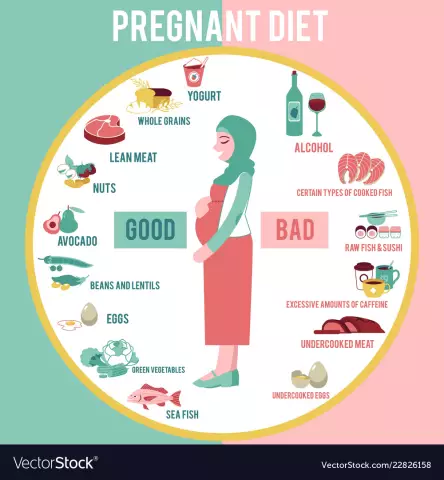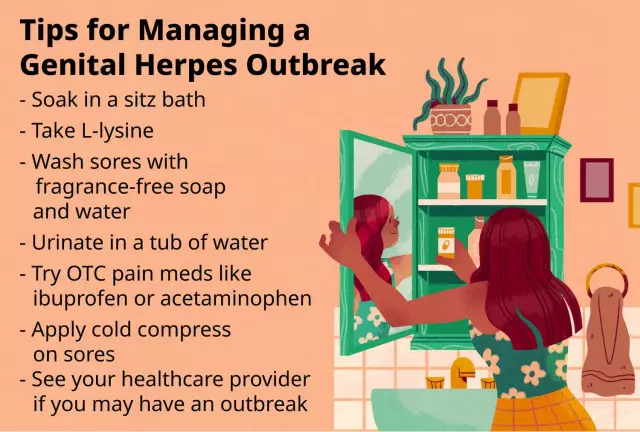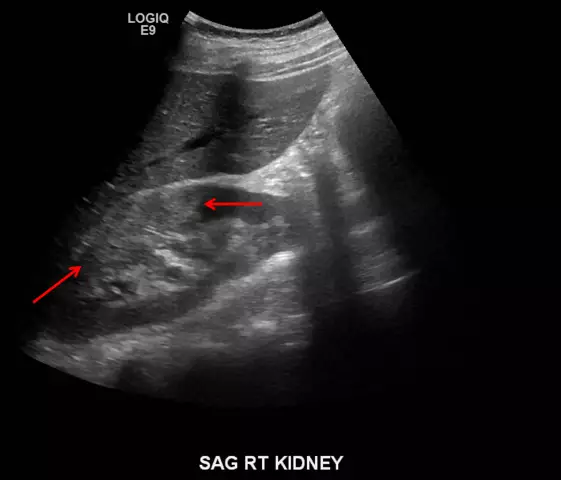- Author Rachel Wainwright wainwright@abchealthonline.com.
- Public 2023-12-15 07:39.
- Last modified 2025-11-02 20:14.
Diet for pregnant women

Diet for pregnant women - a balanced diet of a woman during pregnancy, which contributes to easier bearing of a child, correct weight gain, and normal development of the fetus. Proper nutrition, appropriate for the period of pregnancy, will help not only avoid the unwanted consequences of pregnancy (excess weight after childbirth, changes in the condition of the skin and hair), but also avoid some of the symptoms characteristic of trimesters (nausea, heartburn).
Diet for pregnant women: what is the danger of being overweight during pregnancy
The optimal weight gain during pregnancy is highly individual and will largely depend on the woman's initial weight before pregnancy. If you are underweight in terms of BMI (less than 18), the risk of gaining excess weight is much higher than with a normal BMI or a little overweight. With multiple pregnancies, weight gain is slightly greater.
Normally, a woman gains from 7 to 14 kg during pregnancy. The diet for pregnant women is somewhat different from traditional diets for weight loss. During this period, it is much more important to balance the amount of proteins, fats and carbohydrates, as well as vitamins, micro- and macroelements. The diet for pregnant women allows you to correlate the normal weight gain of the expectant mother, child and its normal intrauterine development.
One of the early signs of pregnancy is considered constant hunger. By following a diet for pregnant women, even with an unconfirmed pregnancy, a woman can easily avoid many of the problems that most expectant mothers face at different times.
Risks to pregnant women associated with poor nutrition:
- Overweight and its consequences;
- Swelling;
- Constipation;
- Allergies;
- Toxicosis;
- Heartburn;
- Feeling of heaviness in the stomach;
- Disorders.
The consequences of being overweight during pregnancy:
- Development of a large fetus;
- Premature birth;
- The risk of developing eclampsia;
- Impaired fetal development;
- Birth trauma;
- Fetal hypoxia;
- Phlebeurysm;

The main reason for overweight during pregnancy is banal overeating and fast saturation with easily digestible carbohydrates. A diet for pregnant women will help to balance the diet, stop hunger between meals. By following a diet during pregnancy, many women manage to maintain their figure, avoid stretch marks, and easily bring the body back to normal after childbirth.
Diet during pregnancy: indications for compliance
A diet during pregnancy is indicated for absolutely all women, however, the diet and type of food will differ significantly based on the woman's weight before pregnancy, family history, and chronic diseases. The diet during pregnancy will vary depending on the dynamics of weight gain.
There is an opinion that during pregnancy a woman should not limit herself to food, since the desire to eat this or that product is dictated not by the body of a pregnant woman, but by a developing child. In fact, the feeling of hunger during pregnancy is due to a change in hormonal levels (increase in estrogen). Often, women in the period before menstruation, when hormone levels change dramatically, also experience an unreasonable feeling of hunger. Therefore, it is categorically impossible to succumb to it. A general diet is recommended from the first weeks. The individual diet will be adjusted by the gynecologist who monitors the pregnancy based on the woman's general condition, test results and weight gain.
Diet during pregnancy is mandatory, but this does not mean that a woman cannot afford an extra snack. The main prohibitions relate to "harmful" products: fast food (fast food), foods containing preservatives, smoked meats, pickles and hot seasonings in large quantities, strong tea and coffee.
Diet for pregnant women: menu by trimester
Why is the menu divided by trimester during a diet for pregnant women? This change in diet is entirely due to fetal development. During intrauterine development, the child receives most of the necessary micro- and macroelements from the mother, thereby depleting her body. The diet for pregnant women is a balanced diet that allows you to fill the missing elements and avoid vitamin deficiency. A diet for pregnant women, the menu of which is compiled by trimester, is the most optimal and easy to follow.
Diet during pregnancy in trimesters contributes to the correct weight gain. In the first trimester, it is enough for a woman to increase her calorie intake by 200 (with multiple pregnancies up to 300), in the second and third trimesters up to 300 calories (up to 400 with multiple pregnancies). In the diet during pregnancy, there are no fasting days and fasting.
Diet for pregnant women: 1 trimester
Women should start following the 1-trimester diet for pregnant women, oddly enough, even before pregnancy, which will allow the body to more easily adapt to the new condition. During this period, it is necessary to increase the intake of folic acid (lettuce, cereals). You should adhere to the rules of a healthy diet: exclude fatty and fried foods, overeating, eat foods rich in vitamins (fruits, cheeses, dairy products). The diet for pregnant women in the 1st trimester involves the use of foods with a high calcium content: dairy products, herbs, cereals, broccoli. The sources of zinc and manganese in early pregnancy are meat (including poultry), nuts, eggs, raisins, oatmeal. In the 1st trimester, it is recommended to exclude foods that contribute to gas formation (cabbage in any form). During this period, the diet for pregnant women should be supported by a vitamin complex.
Diet during pregnancy: 2nd trimester
A diet for the 2nd trimester should help the child grow actively. The diet of a pregnant woman is enriched. However, the increase in calories consumed should be made not in a quantitative change in the consumed food, but in a qualitative one. During this period, the child's body requires vitamins A and beta-carotene, the balance of which in the mother's body will help cabbage, carrots, yellow peppers.
Diet for pregnant women: 3 trimester
Diet for pregnant women 3 trimesters will help a woman get rid of heartburn and stomach discomfort. During this period, doctors recommend fractional meals. The menu of the expectant mother should be rich in calcium, fatty acids that promote the development of the child's brain and central nervous system, iron, which will allow the child to avoid anemia in the postpartum period. The diet for pregnant women in the 3rd trimester should contain fatty fish, red meat, nuts, dark green vegetables, yoghurts, fruits.
In the last weeks of pregnancy, a woman's body requires complex carbohydrates (wholemeal bread, cereals, raw and steamed vegetables).
The diet for pregnant women offers a healthy menu. Each woman determines the amount of products consumed individually for herself. However, it is worth remembering that pregnancy is not a reason to overeat. Excessive food intake will only complicate pregnancy.
Found a mistake in the text? Select it and press Ctrl + Enter.






